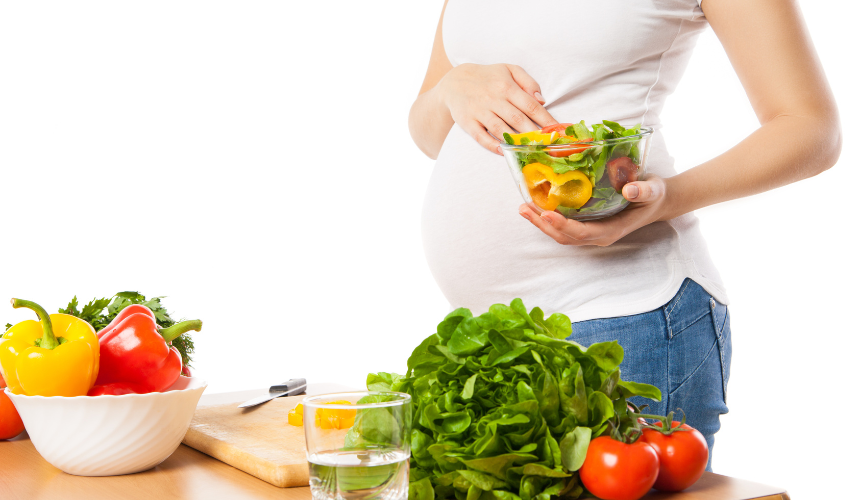Articles

Nutrition During Pregnancy
Nutrition During
Pregnancy
Nutrition during
pregnancy should be balanced to support the baby’s growth without negatively
affecting the mother's health. There’s a common saying that a pregnant woman
should “eat for two,” but this belief is incorrect. Overeating can harm both
the mother and the fetus and may lead to obesity and complications during
delivery.
The amount of energy a
pregnant woman needs depends on her pre-pregnancy weight and energy
expenditure. Her diet should provide all the nutrients needed for both her and
the fetus.
How does the fetus
receive nutrients in the womb?
The fetus receives all
the essential nutrients and oxygen through the placenta and umbilical cord. It
also eliminates waste and carbon dioxide through the same system.
Key nutrients
essential during pregnancy:
- Essential fatty acids: Important for brain development and cell
division.
- Vitamin D: Aids in calcium and phosphorus
absorption, crucial for skeletal formation. Deficiency can lead to low
birth weight, tetany, and osteoporosis in the mother.
- Vitamin E: Mostly transferred to the baby in the
last 10 weeks. Preterm babies may need supplements.
- Vitamin K: Deficiency can lead to hemorrhaging due
to poor blood clotting. Newborns are typically given a Vitamin K dose at
birth.
- Folic Acid (Folate): Essential in early pregnancy for brain
and nervous system development. Deficiency may lead to spina bifida,
miscarriage, slow growth, and preterm birth.
- Vitamin B12: Especially important for vegan mothers.
The fetus stores enough for the first 6 months.
- Calcium: Needed for the baby’s bone development, especially in the third
trimester. Inadequate calcium and Vitamin D affect the mother’s bones and
teeth.
- Iron: Vital for hemoglobin production and oxygen delivery. Deficiency
can cause anemia. The fetus stores iron for the first 6 months. If
hemoglobin is below 10 mg/dL, supplements are prescribed.
- Fiber: Helps prevent constipation, which is common during pregnancy. A
fiber-rich diet and light exercise are recommended.
How many extra
calories are needed?
Pregnant women need
only about 300 extra calories per day, and only during the second and third
trimesters. Teen mothers or physically active women may require slightly more.
These extra calories should come from nutritious foods.
Foods to avoid
during pregnancy:
- Unpasteurized milk: May contain harmful bacteria not
destroyed by boiling.
- Soft cheeses, ready-made salads, deli
meats: Risk of Listeria
monocytogenes, which can lead to miscarriage.
- Raw eggs or foods containing them (e.g., mayonnaise, cold soufflés,
mousse): Risk of Salmonella.
- Liver: High in Vitamin A, which may cause birth defects.
Cravings
(Al-Weham):
Cravings are common
and due to hormonal changes, not nutrient deficiencies. For example, craving
sweets or pickles isn’t necessarily due to a sugar or salt deficiency.
Heartburn during
pregnancy:
Affects 30–50% of
women, especially in the last trimester. To reduce symptoms:
- Eat slowly and chew well.
- Avoid eating just before bed.
- Drink between meals, not with them.
- Avoid spicy, fatty, or acidic foods and
large meals.
- Elevate the head while sleeping.
Morning sickness
(nausea):
Common in the first
trimester due to hormonal changes. To reduce nausea:
- Eat small, frequent meals.
- Eat plain starchy foods (bread, crackers)
in the morning.
- Avoid strong-smelling or fried foods.
- Drink plenty of fluids—at least 35 ml per
kg of body weight daily (e.g., 9 cups/day for 65 kg woman).
- Get fresh air and rest.
- Consult a doctor if vomiting is severe.
Can pregnant women
follow a vegetarian diet?
- Lacto-ovo vegetarians (consume eggs and
dairy): Can meet nutrient
needs but may need iron and B12 supplements.
- Strict vegans: Risk deficiency in protein, B12, Vitamin
D, iron, and calcium. Large amounts of legumes are needed to meet protein
needs, which may cause bloating.
Gestational
Diabetes:
Gestational diabetes
is high blood sugar during pregnancy and typically resolves after delivery. It
can signal higher future risk of Type 2 diabetes, especially in women over 30,
those with obesity, or with a family history of diabetes.
Caffeine during
pregnancy:
Excessive caffeine can
cause low birth weight and increased fetal heart rate. Pregnant women should
limit caffeine to under 300 mg/day:
- 3 mugs brewed coffee = 300 mg
- 4 cups instant coffee = 300 mg
- 6 cups tea = 300 mg
- 8 cans soda = 320 mg
- 4 energy drinks = 320 mg
- 8 bars chocolate = ~300 mg
Do pregnant women
need supplements?
If diet is balanced
and includes:
- 3 cups of milk = sufficient calcium
- Variety of fruits and vegetables =
sufficient vitamins/minerals
Supplements should be
taken under medical supervision only after appropriate lab testing.
Recommended weight
gain during pregnancy:
Based on pre-pregnancy
BMI:
|
BMI Category |
Recommended
Weight Gain |
|
Underweight
(<19.8) |
12.5 – 18 kg |
|
Normal (19.8 – 26) |
11.5 – 16 kg |
|
Overweight (26 – 29) |
7 – 11.5 kg |
|
Obese (>29) |
<6.8 kg |
- Twins: 15.9 – 20.5 kg
Should pregnant
women diet to lose weight?
No. Weight loss diets
during pregnancy can harm the baby. Focus on balanced nutrition. Overeating
sweets and large portions “for the baby” is a common misconception and leads to
unnecessary fat gain.
Can pregnant women
exercise?
Yes—with a doctor’s
approval. Walking, light jogging, and swimming are safe. Avoid high-intensity
or abdominal-pressure activities.
Risks of high blood
pressure before pregnancy:
- Higher risk of strokes, clots
- Lower baby weight
- Placental abruption
Pre-conception blood
pressure control is critical.
Transient
hypertension vs. preeclampsia:
- Transient hypertension: Temporary, mild, and resolves
post-birth.
- Preeclampsia: Serious condition with:
- High blood pressure
- Protein in urine
- Generalized swelling
- Headaches, blurred vision
- Rapid weight gain
- Slow fetal growth
Risks of smoking
during pregnancy:
- Reduced oxygen/nutrient delivery to the
fetus
- Lower appetite in the mother
- Poor fetal growth
- Low birth weight
- Delivery complications
- Placental abruption
- Miscarriage
- Infant ear infections
